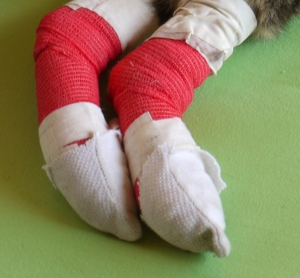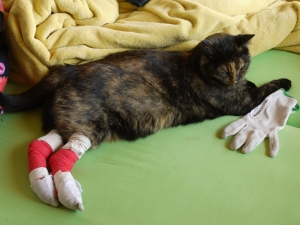Sie wissen alle, dass in einem perfekten Museum alles zur richtigen Zeit am richtigen Ort ist. Dummerweise ist dies keine perfekte Welt, deshalb gibt es auch kein perfektes Museum. Also ist es Teil des Jobs eines Registrars zu improvisieren. Provisorien, Übergangslösungen, Ersatzlösungen… den gesunden Menschenverstand und manchmal den nächsten Baumarkt nutzen, um das Problem in den Griff zu kriegen. Meist nutzt man seine Alltagserfahrung, um sie auf die Museumswelt zu übertragen. Jetzt habe ich entdeckt, dass es auch anders herum funktioniert.
Neulich ist meine Katze aus großer Höhe auf etwas sehr hartes, raues gefallen. Wir vermuten von einem Gerüst, Dach oder Baukran auf die Asphaltstraße. Das führte dazu, dass ihre Pfoten aufplatzten, ihre Krallen splitterten und sie zwei davon komplett verlor. Der Tierarzt bandagierte ihre Hinterläufe, aber als sie versuchte, mit den Verbänden zu gehen, rutschte sie immer wieder auf dem glatten Parkettboden aus. Nun, wie Sie der Beschreibung des Unfallhergangs entnehmen können, ist still in der Ecke zu liegen nicht die große Stärke meiner Katze und vor allem nicht ihre Vorstellung von Spaß. Also lief sie immer weiter und rutschte immer wieder aus. Da fing mein Depotverwalterhirn an zu arbeiten….
Wie die meisten Leute die in der Sammlungsarbeit beschäftigt sind habe ich einen privaten Vorrat an Handschuhen: Nitril, Latex, Baumwolle, Leder… für jeden Zweck den richtigen Handschuh. Darunter auch diese praktischen Exemplare, die sicherlich die meisten von Ihnen kennen werden:
Sicherlich nicht für jeden Einsatzzweck geeignet, denn die Noppen sind aus PVC, aber genau die richtigen, um etwas mit einer glatten, rutschigen Oberfläche zu transportieren. In meinem Fall war es genau umgekehrt: sie sollten etwas auf einem glatten, rutschigen Boden halten.
Ich opferte zwei Daumen und improvisierte Socken, die ich über die Verbände ziehen konnte:
Später habe ich die Socken noch mit Leukoplast fixiert. Jetzt ist meine Katze zwar immer noch weit davon entfernt eine glückliche Katze zu sein, aber sie kann wieder ohne auszurutschen herumtollen.
Problem gelöst.
Angela



My glove supply includes long gold lame gloves, for those artifacts where plain white cotton just won’t do.
________
Español:
Mi oferta incluye guantes largos guantes de lamé dorado, para esos artefactos donde el algodón común blanco no es suficiente.
Hi Randy,
LOL! Just added them to my list of gloves. I can imagine some cases! 🙂
Cheers!
Angela
________
Español:
Hola Randy,
¡Qué risa! Los acabo de agregar a mi lista de guantes. ¡Puedo imaginarme algunos casos! 🙂
¡Salud!
Angela
Great story! And I love the photos. My sister’s cat once fell from a 5th floor window, and we speculate from her almost complete lack of injury that she rode down on the window screen, which was found next to her.
Cheers!
Anne
__________
Español:
¡Grandiosa historia! Y amo esas fotos. El gato de mi hermana una vez cayó desde un piso 5, y especulamos sobre su casi total falta de lesiones, pues se deslizó encabalgada sobre la pantalla de la ventana que se encontraba a su lado.
¡Salud!
Anne
Thanks, Anne. OMG, I can imagine! Lucky cat!
Cheers!
Angela
________
Español:
Gracias Anne. Ay, Dios mío, puedo imaginarlo. ¡Pobre gato!
¡Salud!
Fernando
[Marked as spam by Antispam Bee | Spam reason: Server IP]
Cute! You solved the problem in a unique way.
Brilliant. You may be too young for this TV reference, but I call this doing a MacGyver. Or that I am Ms. MacGyver.
________
Español:
Brillante. Puede que tú seas demasiado joven para esta referencia de la televisión, pero yo llamo a eso hacerlo a lo MacGyver. O que yo soy la Sra. MacGyver.
Thanks, Laura! I know the series and I even use „to macgyver myself out of a situation“ sometimes as a verb…
Cheers!
Angela
________
Español:
¡Gracias, Laura! Conozco la serie, e incluso he usado el verbo „macgyvearme“ para salir de alguna situación…
¡Salud!
Angela
Terrific idea! Conservators are constantly required to improvise or „play it by ear,“ so this was particularly meaningful to me (and I have had my share of dozens of cats over the years).
There’s a term used commonly in Guatemala (I don’t know if it is known in the rest of Latin America)- „chapuz.“ It is the equivalent of „jerry-rigged“ (probably British) and refers to a job done with improvised pr readily available materials and not much know-how. So this concept is well-known, perhaps especially in the third world, where formal education and funds for suitable materials are not abundant.
________
Español:
¡Es una idea fabulosa! Los conservadores están constantemente obligados a improvisar o a „tocar de oído“, por lo que fue especialmente significativa para mí (y mira que yo he tenido mi parte del asunto, con docenas de gatos en los últimos años).
Hay un término comúnmente usado en Guatemala (desconozco si existe en el resto de Latinoamérica): „chapuza“. Es el equivalente (probablemente británico) de realizar un trabajo con materiales improvisados y fácilmente disponibles, y sin mucho de „saber-cómo“. Así que este concepto es bien conocido, tal vez especialmente en el tercer mundo, donde la educación formal y los fondos para los materiales adecuados no son abundantes.
Thanks, Molly. We in Germany sometimes use the term „mit Bordmitteln“ = „with what’s on board“, which derives from shipping. If you are on the ocean, you have no chance to fix something by buying the right supply. You just have to see what you’ve got and fix it with this. Common practice not only in the so called third world countries…
Cheers!
Angela
________
Español:
Gracias, Molly. Nosotros en Alemania algunas veces utilizamos el término „mit Bordmitteln“ = „con lo que esté a bordo“, lo cual se deriva de la navegación. Si tú estás en el océano, no tienes oportunidad de arreglar algo comprando el repuesto adecuado. Solo puedes contar con lo que tengas. Es una práctica común no solo en los llamados países del tercer mundo…
¡Salud!
Angela